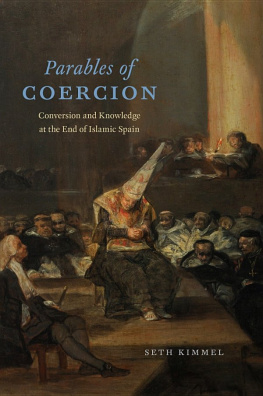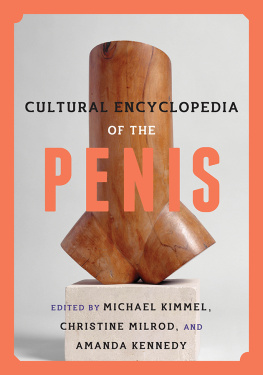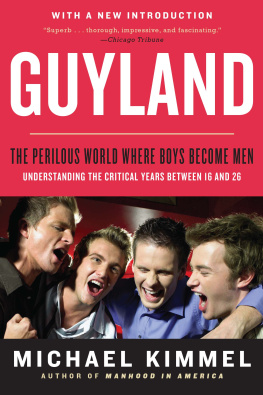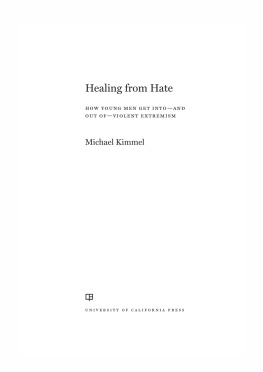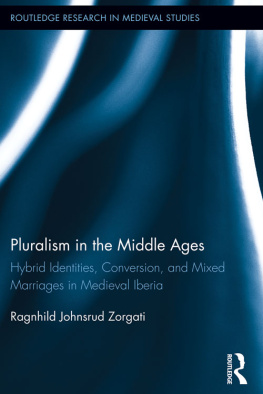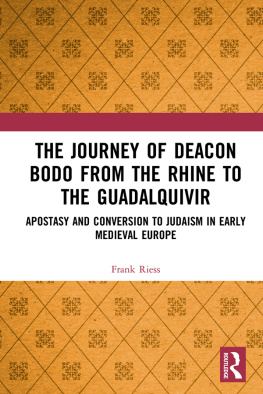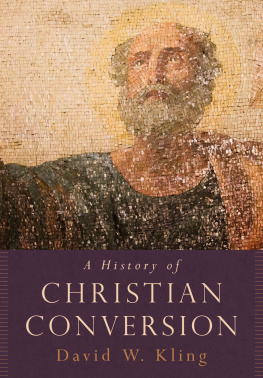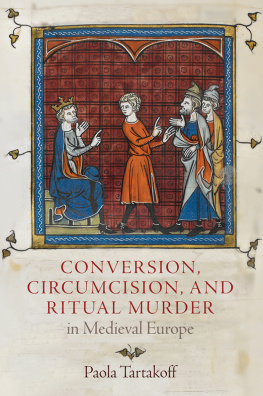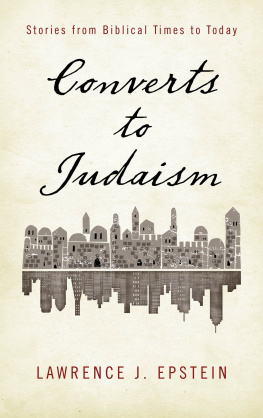To Join the Banquet
who, Valencia argued, possessed the necessary discretion to be more lenient than their inquisitorial counterparts. By participating in this debate about the Moriscos, in other words, Valencia did not only reimagine the relationship between Church and Crown. He also defended his own intellectual communitys shared humanistic training and interpretive methods.
From the perspective of expulsion advocates like Archbishop of Valencia Juan de Ribera, Valencias coupling of Morisco assimilation with social reform was misguided. By the end of the sixteenth century, more than seventy-five years after the forced conversion of Spains last remaining Muslims, Ribera had come to see the Moriscos as stubborn apostates. Previous dispensations negotiated between the converts and the Crown had obstructed rather than facilitated integration. For Ribera and his allies, the time for discussion about strategies of conversion and catechism was over. The spiritual health of the empire and the legitimacy of its inquisitors and evangelizers now hinged upon exclusion rather than assimilation. Analogous to Valencias opposition, Riberas advocacy for expulsion was a defense both of the Churchs authority to promote orthodoxy and of the scholastic training of canon lawyers.
Disagreement about Morisco expulsion was the newest iteration of a century-long struggle over how to eliminate Islam and its traces from a Christian-ruled Iberian Peninsula. The central claim of this book is that through this struggle, peninsular intellectuals revolutionized canon law, philology, and history writing. In the sixteenth and early seventeenth centuries, the overlapping groups of university theologians, preachers and inquisitors, classicists and Hebraists, and court advisors and recent converts who participated in debate about the Moriscos defended their political relevance and interpretive methods to audiences beyond the confines of their particular communities. Each presented his expertise as uniquely suited to determining the legitimacy and limits of religious coercion, which emerged as one of the fundamental dilemmas raised by Christian conquest and evangelization. To trace the history of these disputes is to study how the figure of the Morisco became a tool of disciplinary change. As the interrelatedness of the Morisco question with anxiety about Jewish apostasy and New World conversion suggests, however, there was more at stake in debates about the Moriscos than the legality of local baptisms or the academic bragging rights of the moment. For Valencia, Ribera, and their interlocutors, the pressing but often implicit questions running through these debates concerned the very definition of religion: Is religion a law or collection of doctrines? Or is it a set of practices and beliefs? Where are the boundaries between the religious and the civic spheres? What, if anything, do all religions share? And, finally, how and by whom should such questions be answered?
In response to these questions about the nature of religious experience and the uses of coercion, some early modern scholars dismissed the Moriscos and their texts as heretical. Others enlisted them as pedagogical or political weapons. Both camps sought to expand the scope of their scholarly authority by participating in this conversation, which toggled between major theological issues and the regional details of Morisco policy. In an array of treatises and personal correspondence, they considered demographic and economic matters related to imperial management; they composed chronicles, historical fiction, and epic poetry recounting pastoral successes and minority uprisings; and they penned Bible commentaries and legal opinions in efforts to render exemplary episodes from the early history of Christianity, such as Jesuss parables in Luke and Matthew and Pauls anecdotes in Corinthians and Galatians, newly relevant to contemporary affairs. I read this corpus of manuscripts and early printed books alongside archival evidence that specialists in Spanish history and culture will find familiar, but I pay particular attention to my sources narrative conventions and conditions of production and reception. By studying how early modern scholars selected, interpreted, and circulated these varied texts on coercion and conversion, I explore the relationship between debates about religion, on the one hand, and the shifting conditions of knowledge production, on the other hand. Dispute over the conversion and assimilation of peninsular Muslims became a staging ground for the early modern reevaluation of Christian orthodoxy and the renovation of scholarly practice.
Although these disputes later served parallel uses in the Italian, French, and English contexts, I focus on sixteenth-century obscure the history and consequences of tolerance and intolerance alike.
Organized along a timeline that takes King Fernando II and Queen Isabel Is conquest of Granada and expulsion of the Jews in 1492 as a crucial turning point, peninsular history is rife with flawed paradigms of such tolerance and intolerance. According to one familiar model, occasional outbreaks of popular violence of Spains last Muslims at the beginning of the sixteenth century and ends with the expulsion of the Moriscos in the early seventeenth century.
The authors who defended the conversions that inaugurated the Morisco period sought to protect the validity of institutionally sanctioned religious ritual and social practices while expanding their own power to regulate orthodoxy. Because only Christians families, and suffer other social and corporal hardships as the cost of inclusion in his community. So why should sixteenth-century New Christians not acquiesce as well? A royal and ecclesiastical policy of coercion toward converts from Islam and Judaism took shape through an effort to engineer the social infrastructure of faith.
To sideline the question of personal religious sincerityoffered a self-interested defense of scholastic pedagogy, but it was a defense that enlarged their colleagues sense of religious coercions critical potential.

